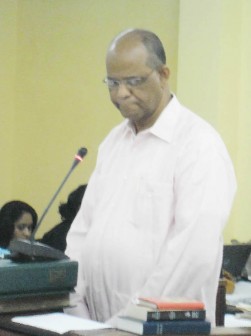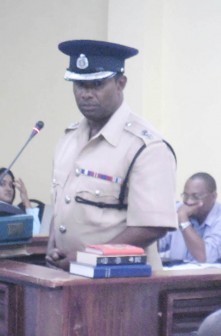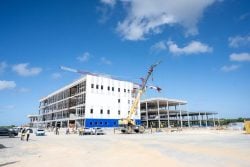Home Minister Clement Rohee yesterday denied charges that government attempted to derail the planned five-day protest at Linden.
Under cross-examination by APNU attorney Basil Williams before the commission of inquiry into the July 18 protestor deaths, Rohee said he received information that persons were shot late on the evening of July 18, although acting Commis-sioner of Police Leroy Brumell had a meeting around 7pm of that day with Crime Chief Seelall Persaud and two others. Rohee said he was not aware of that meeting.
“You told us the reason you called (Senior Superintendent Clifton) Hicken was because you couldn’t get the Commissioner,” Williams said. He was told by Rohee that after the first attempt to contact Brumell, he called Persaud and then Hicken.

“I’m putting to you that your government wanted to derail the five day protest,” the attorney suggested and was told that accusation was false.
“And I am putting it to you that you asked Hicken to ensure that the five day protest was derailed,” he stated again, with Rohee again disagreeing.
“And I’m putting to you that as a result, Hicken was making threats to regional officials,” Williams suggested, making reference to claims made by Gordon ‘Bad Heart’ Calendar that Hicken had threatened him at his home. Rohee told him that he was not aware.
The attorney continued to grill the Minister about his motives on the day in question, suggesting that his plan was to ensure that the protestors did not get past the first day of protest and he was again told that he was not aware of that.
“I’m putting it to you that is why they (ranks) went back under cover until nightfall,” Williams said. “I’m not aware,” he was told. “And that is why there was a coordinated blackout,” he further stated. “I’m not aware,” Rohee responded. “I’m putting it to you that you were aware of that,” the attorney prompted. “And I’m putting it to you that I was not aware of that,” Rohee said.
Audio
COI Hearing 1/11/12 Clement Rohee
COI Hearing 1-11-12 Clement Rohee
COI Hearing 1-11-12 Clement Rohee PT2
Rohee disagreed with William’s opinion that Hicken was his “man on the ground” and said he was not aware that he had called Hicken about their plan to derail the protest. The witness further stated that it was false to say that Hicken informed him of the three deaths at around 9pm on July 18. “And I am putting to you that after yuh man Hicken did his bidding, you pulled him out of Linden for his own safety,” Williams suggested. Rohee in response stated, “I don’t have a man, I have a wife.” The attorney affirmed that it was not his intention to imply otherwise.
Independently- supervised autopsies
Asked whether he was aware of the arrangements that were made for the custody of the bodies of the three men who were shot and killed at Linden —Ron Somerset, Allan Lewis and Shemroy Bouyea —Rohee said that Hicken had informed him of some of the steps his ranks wanted to take but they were prevented from so doing.

Under further questioning, he said that he was aware that in several cases of unlawful extrajudicial killings, the police take custody of the bodies and pathologists under the government’s control subsequently perform the autopsies.
“Between 2001 [and] present, no permission was given for independent pathologists to perform autopsies on victims of extrajudicial killings,” Williams said, while the Minister said that he was not in a position to answer that. He did, however, explain that only if requests are made to that effect would they be considered.
Williams suggested that many requests were made. He added that he was surprised that Professor Hubert Daisley, who was flown in by attorney Nigel Hughes, was not given accreditation to perform the autopsies on three men but was only allowed to observe.
Stunned by this, Rohee asked who the minister was at the time and after being told that reference was being made to the case of the three Lindeners, he said he was not aware of that. “I’ve never refused to give a work permit to a foreign expert coming to perform those duties in Guyana. I was the first to do so,” Rohee said. But when asked if that was in the case of an extrajudicial killing, he responded in the negative.
Commissioner Dana Seetahal clarified whether Dr. Nehaul Singh was employed under the Guyana Police Force and was told that he was.
Williams said, “In other words, the Guyanese people are not happy with the situation where the police shoot a citizen, the police collect the citizen, have custody of the citizen and then the government pathologist performs the autopsies… it means then, that no warhead was ever found in those bodies… all those people killed extrajudicially.” But the minister said he was not aware of those matters.
Commissioner KD Knight inquired if no warhead was ever extracted from the bodies in cases Williams spoke of. “None ever found in the bodies, the bullets always go clear through according to their reports. Now, when you find a warhead, they say is not the police own,” Williams told him.
“In this scenario, isn’t it the proper thing to have an independent pathologist deal with these matters?” Williams asked, opining that the government must facilitate any person whose family was killed by the police to have an independent pathologist accredited to perform the autopsies in Guyana.
Videos
COI Hearing 1/11/12
Rohee stated that if the request was made under his watch, then permission would have been granted. Williams then suggested that this must be with the exclusion of the local pathologist and was told by Rohee that he is not ready to give that commitment.
“I’m giving the commitment that the government pathologist will continue to do what he is doing according to the laws and if a request is made for an independent pathologist to come into the country, he will be allowed and granted a work permit to perform his functions,” Rohee said. Asked if the independent pathologist will be allowed to perform the autopsy, Rohee said, “I cannot give a commitment here and now.”
‘Morphing process’
Rohee was also questioned about his competence as it relates to public security. Recalling the year 2006, when Rohee took the office of the Home Affairs Minister, Williams asked him whether Guyana was at that time in grave disorder and insecurity. Rohee said he would not describe it that way.
“People dropping every day, bodies turning up dead in trenches… that is not grave disorder… those hundreds of killings won’t have caused insecurity?” Williams asked.
“Not to my knowledge… I won’t describe it as grave disorder,” the Minister replied.
When asked if his immediate task would have been to restore public security and confidence in the Guyana Police Force, Rohee said it was to enhance the force. He further stated that he was not aware whether perpetrators were ever brought to justice for those extra judicial killings. When asked if he would agree that excessive force is still being deployed under his watch, the minister considered that to be a judgment issue.
When asked whether he considers his term so far successful in moulding the police force, considering the death of three persons at Linden, Rohee stated that it is a “morphing process” and that constant police training programmes are in progress.
Rohee was also asked about the Police Complaints Authority, which he said is established by statute. But he could not recall whether the law gives it the jurisdiction to investigate criminal matters against the police.
“This is something we would have to look at and I have to know the genesis because the police force is the only organisation in a country that investigates in relation to criminal matters… No other organisation does that. It investigates itself for disciplinary matters, it investigates itself for criminal matters… for example, if a judge commits a criminal offence, it’s the police who investigate him but if judges or any other lawyers professionally commit some unethical act, that’s now done internally, but if they commit a criminal offence it’s the police… only way equality can be brought within the society is to have an independent body that investigates the allegations of criminal acts by the police… so that nobody, no organisation in the society will be able to investigate itself in relation to criminal matters but in relation to disciplinary matters, fine,” Knight stated.
Seetahal queried about the minimum entry requirements into the police force and was told by the minister that five CXC subject passes are needed, inclusive of English and Mathematics. However, he stated that this has over the years been lowered but could not say exactly what the current requirements were.




